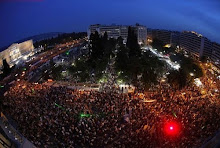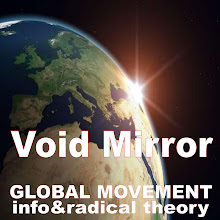Showing posts with label anarchism. Show all posts
Showing posts with label anarchism. Show all posts
19.7.16
VOID NETWORK "On the tragic and the farcical of the British referendum"
“The parliamentary regime leaves everything to the decision of majorities; how shall the great majorities outside parliament not want to decide? When you play the fiddle at the top of the state, what else is to be expected but that those down below dance”?
- Karl Marx, The Eighteenth Brumaire of Louis Bonaparte, IV (1852)
If we take as reliable evidence the anxiety (verging to panic) that spread over the social media among supporters of Remain once the results of the British referendum were made known, it would seem that a real tragedy has been played out on the 23rd of June. Or was it a ‘triumph of democracy’, as the celebrations of some leftists, who saw in the result a vindication of their own anti-EU agenda, would have us believe? Without adopting an imaginary middle road, it is advisable to distance oneself from both attitudes; neither the mix of fear with self-righteous indignation against those who voted “Leave”, nor the hasty projection of one’s own wishes add anything to a critical understanding of the referendum, of its driving forces, its context and its outcome. A drama no doubt unfolds, but what is its nature? Arguing that Brexit, in its immediate manifestations, has more farcical elements than tragic, is not meant to suggest that the referendum was an insignificant event; far from it. A farce can be deadly serious in its consequences, so much so if it is part of an unfolding tragedy.
Given the dominant presence of nationalist and anti-immigration ideas in the "Brexit" camp, it is difficult to claim that the result of the referendum was good or positive from a leftwing (or more specifically anarchist, or communist) perspective. It is certainly a political no less than a theoretical mistake to equate the putatively largely working-class composition of those voting for “Leave” with a “victory of the working class”, as some anti-EU left forces have done, both in Britain and abroad. In sharp contrast, taking into account the broader rise of the far-right and nationalism in Europe (manifested in their more vulgar and violent form during the Euro competition taking place in France), Brexit should be a cause of worry. If it is indeed true that considerable parts of the working-class voted for Brexit, this shows that they tend to associate the recovery/protection of their labor rights and the regaining of their “lost dignity” with the fantasy of a recovered national sovereignty which will allow “their state” to protect them from foreign dangers, whether these are posed from “above” (the EU bureaucracy) or from “below” (the immigrants). Such is a worrying trend in much of (‘north’ but also ‘east’ and ‘south’) Europe.
But if there was very little ‘Lexit’ in ‘Brexit’, no less problematic were the hegemonic political forces on the other camp, the “Bremain” campaign. Even if parts of British capital may find in Brexit an opportunity for profit or were even directly supportive of the Leave campaign, Remain was still the predominant strategic choice of Britain’s ruling elite. It is indeed strange to hear claims that the victory of Remain would have kept Britain an open and hospitable country for immigrants, especially if we widen the gaze from educated professionals to the poor and proletarianized masses. Remain in practice would lead automatically to the implementation of the agreement made between the British elite with its European counterparts, which would not only allow the British state to impose further restrictions on immigration flows, but which had also earned further exemptions of Britain from EU policies and regulations. The major spokesman of “Bremain” was Cameron, not Corbyn; no more than in the Brexit camp, did the Left set its own agenda in the Bremain camp. At least from the point of view of an outside observer, there is a sad impression that in both sides the Left was simply a supporting cast, with the more radical (including antiauthoritarian and anarchist) voices being entirely marginal. From our perspective, this is the crucial problem.
It is understandable why middle-class professionals (whether ‘left’, ‘right’ or ‘center’) who have benefitted from the opening of the labor market that the EU has brought, would be in favor of Remain. On the other hand, what cannot be accepted is the self-evidence with which this choice has been represented, an uncritical attitude that ends up identifying interests stemming from a concrete class position with a supposedly ecumenical “imperative of reason”. As if it was only lack of education and parochial bias that could make someone vote for Brexit. No wonder that the article which supposedly proved that those who voted for Leave “did not really know what they were doing” became viral in the social media. This attitude tends to blind to the fact that for a growing number of people, especially those coming from the lower classes, the EU is not appealing at all. No matter its further evaluation, the fact to reckon with is that in all too many cases where the vox populi was called upon, the results of the referendums were negative for the EU. Can this possibly be only for the wrong reasons?
Like the last year referendum in Greece, there is one very positive element in the recent referendum in Britain: it verified the decline of polling as a technique of power, meant not to reflect public opinion but to control and shape it. It is certainly a sign of dignity to vote what you believe is the right choice, and not let all this cacophony of “warnings of doom”, which were accompanying polls, influence you. In that context, silly as it sounds, Donald Tusk’s claim that Brexit would threaten “western political civilization” (!) must not be taken lightly. It expresses the deep “hatred of democracy” and the underlying “fear of the masses” felt by the governing elites of Europe. Sadly, much of the sentiment among the professional middles-classes condones, even unwittingly, this anti-democratic bias. The poor it seems cannot be relied upon.
If the discourse deriving from dominant media, even at its more liberal and moderate shapes, was annoyingly pedantic and dystopian, much of the representations of EU coming from left intellectuals were depressingly idealist, one of them going as far as to claim that “if the EU did not exist it would have to be invented”. There is certainly something noble in the bourgeois cosmopolitanism that stands as a historical foundation of the EU. It is extremely doubtful however that the ghost of Kant is enough to redeem the neoliberal logic that pervades the architectonic of the “actually existing EU”. The EU that is said by supporters of “Bremain” to stand as the only protective net for labor and democratic rights is none other than the institutional apparatus which imposes austerity on whole peoples and which consistently promotes laws and policies that attack not just specific labor rights, but subvert the very idea of collective right as a basis for organized labor struggle. The EU may continue to draw its legitimacy from a vision of cosmopolitan democracy as an organic counterpart to market induced prosperity, but it consistently moves closer to a bureaucratic, authoritarian and internally divided imperium.
Equally problematic is the representation of nationalism to be found in much of the modern Left. Nationalism is neither an inexplicable evil affecting the uneducated, nor a barbaric force invading the EU from outside. It is generated by the dynamics and expresses the contradictions of the EU itself. Thus, while it may be a force of subversion, it is immanent to the historical process of European integration. In fact, nationalism not only subverts European completion by leading to fragmentation, but it also augments the solidification of ‘Fortress Europe’.
The contradictions of this process will be played out even more now, in the attempt to manage "Brexit". The EU elite, under the auspices of Germany, may well try to give to the “real” Brexit a punitive dimension, so that no political paradigm will be set. Yet, they will hardly want to instigate a full-scale breakdown of economic and political relations with Britain. Likewise, the national-populist political forces prevailing in the Brexit side –following here their European counterparts, like the National Front in France and the Freedom Party of Austria- seem hardly keen to challenge British capital, or indeed to attempt any serious subtraction of the British economy from its European (much less international) setting. If “Brussels” appear to want or indeed to afford of a punishment that does not really punish, national-populists fantasize over a change that will not change much. Thus, from the tragic showdown of Brexit we have been led to the farcical spectacle of technocrats and politicians who preached doom now saying that there is no cause for worry; of Johnson, Farage et co who preached salvation taking back their promises (indeed, literally taking them down from the online site) or even quitting; of viral videos with regretted voters of Leave; of intentional bureaucratic forestallments; of spreading hopes and mounting suspicions that Brexit may somehow not be implemented.
The crucial point to insist upon here is that the farcical aspects of Brexit do not cancel its seriousness. For as the dust raised by the result settles down, a genuine contradiction appears: if “reclaiming Britain” does not mean protectionism, an organized labor market along national lines, channeling of money-flows into public investment and public institutions, a different set of economic policies (etc.), what “leaving the EU” means? If it is simply a more closed off and xenophobic political structuring of the nation-state, while maintaining key interstate agreements with the EU, how can this bring any real solutions to the multifaceted problems that generate “EU-exit” as a mass desire? On the other hand, if leaving the EU does not have any serious cost on the existing geopolitical and economic configurations, if one can be in the EU without also becoming integral part of it (as the agreement achieved by Cameron had determined) what does it mean to “be in the EU”? If, ultimately, the dominant forces in both camps dance to the rhythms of “the markets” how do we thus assess the meaning of the referendum? If the tragic denotes a conflict between two forms of right or justice, perhaps then, there was no real tragedy staged in the 23rd of June.
It is not a question of proving that the referendum was a “pseudo-dilemma” that will have no consequences. Still, it is something to reflect upon that a referendum took place over an issue –exit of the British state from the EU-, whose implementation no one exactly has worked out, and more fundamentally, who very few want to have far-reaching, thus destabilizing, effects. There may have been political opportunism behind the British referendum, just like there may have been opportunism behind the Greek referendum last year. But, there would be no polarization and mobilization, no mass anxieties and mass fantasies, no elite fears and intense elite negotiations, if it was just that. As a historical product, the referendum of the 23rd expresses much more than political opportunism, much more even than the problem of Britain’s status in the EU. While in its immediacy Brexit is more farcical then tragic, there may still be a dimension of tragedy inscribed into it, which pertains to the referendum’s character as an act of a wider drama: the ‘EU project’.
Whatever other historical lines of meanings it may embody, the EU founded in 1993 is at its most basic the form that the internationalization of capital takes during the "era of neoliberalism" in Europe. In this respect, Brexit is but one expression of the deep crisis of this process, which is also a project carried out by concrete social and political forces. This crisis certainly manifests itself as a series of functional short-circuits in the institutional apparatus of the Union, but it does not mean only “dysfunction”. It is a moment of truth that opens up EU to its political presuppositions and to conflicting political positions that bear different potentials. “We” are certainly not into this “all together” and there was nothing problematic in the division that the referendum brought. The problem was that it divided for the wrong reasons. But, we are not quite as yet caught into an inescapable battle between nationalist fragmentation and European completion. Indeed, it is far from coincidental that national-populists side with the political establishment whenever a popular movement appears to become threatening to order, as it happened recently in France. Stark as their difficulty may be to block austerity or pose a political alternative that is able to operate on the same level of totality as neoliberal governmentality does, we must not underestimate the dynamic of the lines of flight and change opened up by recurring popular movements and uprisings around Europe. It is certainly in their lines that we stand.
The recent demonstration in London, whereby antifa banners flown side by side with EU flags, has verified the contradictions that we are caught into and the inescapable political confusion. The complex dynamic that the crisis of the EU project generates continues to accelerate, creating a rather fluid situation which belongs and adds up to the generalized instability that spreads around the world. In this context, any rounded assessment would be premature. Brexit may have serious long-term consequences, but no referendum ever brings the end of the world and the apocalyptic tone of some Remain supporters should not be taken at face value. It is, for sure, as understandable as its pro-EU sympathies, why the international middle class of educated professionals fears instability and uncertainty. But while not all change is for the best, is there ever any meaningful change that is not accompanied by uncertainty and instability? Given indeed its structure and architectonic, is it possible to conceive of a meaningful reform of the EU in terms of a smooth process, without mass popular insurrections? However that may be, investing too much on the electoral result of Brexit (either positively or negatively) is ill-advised. Given the present configuration of powers, expressed after all in the terms of the debate, Brexit in itself will not bring any cataclysmic change. It will especially not put a direct end to the dominant policies and logic of austerity, either in Britain or in the EU. In the end of the day, however far-reaching effects the result of the referendum may prove to have, the important things are not decided in voting ballots, but in and out of well-guarded and secluded offices, in their corridors and underneath their tables, in the streets outside, in squares, in workplaces, in neighborhoods; in all these places where the real problems of power and justice are being played out.
VOID NETWORK
[Theory, Utopia, Empathy Ephemeral Arts]
http://voidnetwork.blogspot.com
20.7.14
Void Network | Tour de France | Soulevements Mondiaux Du 21e Siege|Conférence Publique| July 24 /CAIRN / PARIS
Conférence Publique
SOULEVEMENTS
MONDIAUX
DU 21e
SIECLE
du mouvement ‘Occupy’
aux
révoltes asiatiques
et à la Révolution planétaire
avec George Katsiaficas,
Sissy Doutsiou, Tasos Sagris,
Richard Greeman et Harry Halpin
19h / jeudi 24 juillet
au
CAIRN
18,
rue Victor Massé, 75009 Paris -métro Pigalle
Les discutants enquêteront sur la
stratégie, la tactique et la théorie à partir des soulèvements mondiaux de 2011
et tenteront de proposer des réponses sur le développement possible des
mouvements actuels. En anglais avec traduction française
George Katsiaficas, élève d’Herbert Marcuse et historien des mouvements
sociaux, présentera son travail sur “l’effet Eros,” le pouvoir qui rassemble
les gens pour combattre les pouvoirs de “Thanatos” (la Mort) et nous partagera
ses expériences et conclusions de son nouveau livre ‘Les soulèvements inconnus
d’Asie’ qui trace les mouvements autonomes d’Indonésie à la Corée à notre
époque.
Militants grèques du collectif
culturel/politique anarchiste
Void Network, Tasos Sagris (co-éditeur de l’anthologie “Nous sommes une image
d’avenir: la révolte grèque de décembre 2008”) et Sissy Doutsiou (poète, actrice, activiste culturelle) parleront des
projets sociaux qui sont montés depuis les ‘mouvements des places Occupy’ de
toute la Grèce en 2011 et expliquront les méthodologies de l’actuelle
insurrection sociale contre la crise économique et l’apparat politique en
Grèce.
Richard Greeman,traducteur et biographe de Victor Serge, milite aux mouvements sociaux depuis 1957 aux
Etats-Unis (où il a travaillé avec Raya Dunayevskaya), en France (où il était à
Socialisme ou Barbarie) et en Russie (où il a participé à la création du Centre
Praxis en 1997). Il expliquera son ‘Hypothèse d’Archimède moderne’ qui conjuge
le ‘levier’ de la solidarité internationale avec le ‘point d’appui’ de la
conscience planétaire et le ‘plateforme’ de la Toile afin de ‘soulever le
monde’ qui sombre dans la barbarie capitaliste.
Harry Halpin, militant anti-capitaliste et scientifique des
technologies de l’Internet des Etats-Unis ouvrira les débats de la soirée sur
les possibilités futures et visions révolutionnaires en proposant des idées et
s’interrogeant sur de nouvelles practiques et stratégies innovantes dans les
mouvements anti-capitalistes post-marxistes et anarchistes contemporains.
On fera un apéro participatif
avant l’évènement: vous pouvez apporter frommage, pâté, saucisse, olives, pain,
vin etc.
GLOBAL UPRISINGS
OF THE 21st CENTURY
from the Occupy movement
to Asian Revolts and to Global
Revolution
with George Katsiaficas,
Sissy Doutsiou, Tasos Sagris,
Richard
Greeman and Harry Halpin
Thursday 24 July 2014
at the CAIRN
18,
rue Victor Massé,
75009 Paris -métro Pigalle
starts 7
pm
George Katsiaficas, student of Herbert Marcuse and historian of social movements
will explain his work on the "Eros Effect", the power that brings
people together to fight against the powers of "Thanatos" (Death) and
share with us experiences and understandings from the social uprisings in his
new book on "Asia's Unknown Uprisings" that traces autonomous
movements from Indonesia to Korea to our own time.
Members of the anarchist cultural-poltical collective
Void
Network from Greece, Tasos Sagris, co-editor of the book "We Are an Image from The
Future / The Greek Revolt of Dec. 2008" (AK Press, 2010) and poet, actress and
cultural activist Sissy Doutsiou will speak about the social projects that arrose after the 2011
Occupy "movement of the squares" all over Greece and explain
methodologies of on going social insurrection in Greece against economic crises
and the poltical aparatus.
Richard Greeman, translator and biographer of Victor Serge, has been active
since 1957 in civil rights, anti-war, anti-nuke, environmental and labor
struggles in the U.S. (where he worked with Raya Dunayevskaya), France (where he was a member of
Socialisme ou Barbarie) and Russia (where he helped found the Praxis Research
and Education Center in 1997). He will explain his ‘Modern
Archimedes Hypothesis’, which brings together the ‘lever’ of international
solidarity, the ‘fulcrum’ of planetary consciousness and the ‘platform’ of the
Internet to ‘lift the world’ out of capitalist barbarism.
Harry Halpin, anticapitalist activist and internet technologies scientist from U.S.A., will open the following public dialogue
of the night about the future possibilities and revolutionary visions,
proposing ideas and investigating new practices and innovative strategies in
the global anticapitalist, post-marxist and anarchist movements of our times.
The event will be preceded by a potluck ‘apéro.’ Wine,
cheese, pâté, sausage, olives, bread etc
welcome.
VOID NETWORK
[Theory, Outopia, Empathy, Ephemeral Arts]
est.1990 // Athens, London, New York, Rio De Janeiro
http://voidnetwork.blogspot.
+ Global Movement Theory & Info: http://voidmirror.blogspot.com
+ Void Network Channel // Void Optical Art Laboratory: http://www.youtube.com/
Subscribe to:
Posts (Atom)











![VOID MIRROR [theory, info, global movement news]](http://web.archive.org./web/20231124051428im_/https://4.bp.blogspot.com/-UfwKK2SeHh4/V21Egnoqj6I/AAAAAAAARQw/GKumNlK0I-kTQ0wAP52-jYenOSCLDVacwCK4B/s220/CeluBkCWQAAFgxB.jpg)














![READ TEXT ONLINE: WE ARE AN IMAGE FROM THE FUTURE [THE GREEK REVOLT OF DECEMBER 2008 ]](http://web.archive.org./web/20231124051428im_/https://1.bp.blogspot.com/-7slfYOiJA0I/TZ3DN5f-ZsI/AAAAAAAAHB8/59boYsCzvTc/s220/510T1GQ26KL._BO2%252C204%252C203%252C200_PIsitb-sticker-arrow-click%252CTopRight%252C35%252C-76_AA300_SH20_OU01_.jpg)





![THESES ON DRUGS [GREEK LANGUAGE]](http://web.archive.org./web/20231124051428im_/https://1.bp.blogspot.com/-BTy1g77SF2E/TtBxtUQtKQI/AAAAAAAAIMo/NePnW7F6QyQ/s220/%25CE%2596%25CE%2597%25CE%25A4%25CE%2597%25CE%259C%25CE%2591%2B%25CE%25A4%25CE%25A9%25CE%259D%2B%25CE%259D%25CE%2591%25CE%25A1%25CE%259A%25CE%25A9%25CE%25A4%25CE%2599%25CE%259A%25CE%25A9%25CE%259D.jpg)














![GLOBAL EYE [LONDON section of VOID NETWORK]](http://web.archive.org./web/20231124051428im_/https://1.bp.blogspot.com/_vSyk6SJoF1M/Sfr7KhauTxI/AAAAAAAACmM/nCtI6Kzenbg/S220/global+eye+photo.jpg)
















